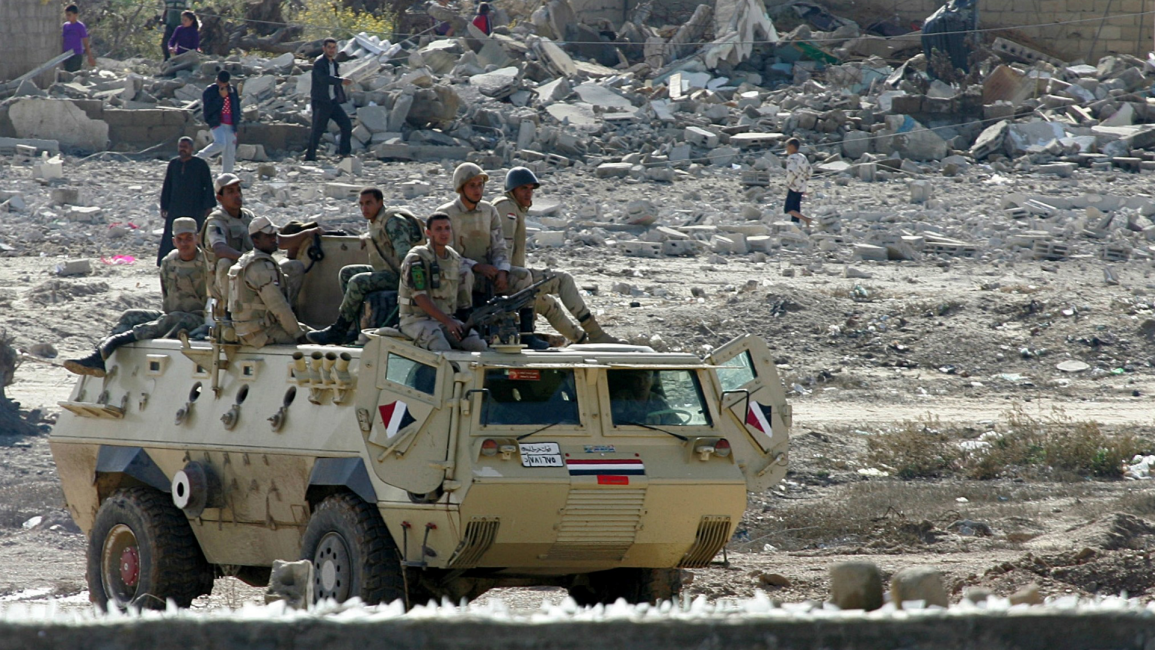
Egyptian buffer zone continues to threaten Gaza
Egypt's decision to create a buffer zone along its border with the Gaza Strip has plunged conditions in the strip to a new low.
The blockade aims to push Gazans to breaking point and reflects Egyptian animosity towards Gaza because it is being governed by Hamas, seen in Cairo as an arm of the now-outlawed Muslim Brotherhood, which opposes Egyptian President Abdel Fattah al-Sisi.
Egyptian authorities have justified their actions by arguing
| Why would Egyptian militants use tiny Gaza for support when they have all of the Sinai? |
they are protecting Egyptian national security because militants fighting the Egyptian government in the Sinai are using Gaza as a support base.
The buffer zone stretches 14km along the entire Egyptian-Gazan border, and extends up to five kilometers into Egyptian territory. Egypt's next plan is to construct impenetrable metal barriers along the border and build a wide water canal.
No one expected Egyptian relations with Gaza could reach this low, especially when Gaza needs all the help it can to overcome the deep crisis it is going through, and keep Israeli threats at bay.
Over the past month, Egypt has increased its pressure on Hamas, the Islamist movement that governs Gaza and which won Palestinian parliamentary elections in 2006.
It has accused the organisation of supporting Mohamed Morsi, the deposed Egyptian president and Egypt's first democratically elected leader, and the Muslim Brotherhood. And measures against Gaza increased after Egypt accused Hamas and Gaza of supporting Egyptian militant groups fighting in the Sinai.
Egypt closed the Rafah border between Egypt and Gaza indefinitely in August 2014, arguing it was to stop militants crossing into its territory.
Egyptian authorities have also demolished dozens of tunnels between the Gaza Strip and Egypt that were used to smuggle food, construction material and other essential items into the strip. They argued destroying the tunnels would stop Egyptian militants hiding in Gaza attacking the Egyptian army in the Sinai, and halt the flow of weapons to militant groups. However, destroying the tunnels has not curbed militant activity in the Sinai, and attacks continue against the Egyptian army.
Creating a buffer zone will also not protect Egypt from militants anymore than destroying the tunnels did. This is because Gaza is not being used to support militant Egyptian groups.
Why would these groups use Gaza as a base? It is small, has the highest population density in the world and suffers under a sffocating Israeli blockade. Militant groups in Egypt have all of Sinai, which is vast and has deserts, mountains, and oases. There is also only a limited Egyptian military presence in the Sinai because of Egypt's peace agreement with Israel.
Egyptian militants have expanded their area of operation to most Egyptian governorates. Reports also show they are being armed by weapons smuggled across the Libyan border. This presents an immense challenge to the Egyptian leadership, which needs to develop policies and strategies that address all of Egypt's internal and external threats.
One of the most immediate challenges is to understand and address the repercussions of Egypt's current policies towards Gaza.
On the Palestinian side, it is imperative for Palestinian leaders to try and repair damaged relations with the Egyptian leadership. Gaza does not have the luxury of time. Gazan suffering only increases the longer the strip remains isolated and unable to rebuild. The situation on the ground is building up toward an explosion.
This article is an edited translation from our Arabic edition.



